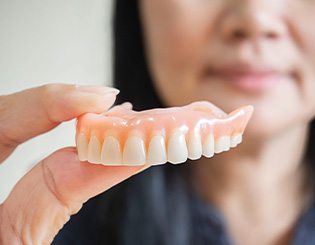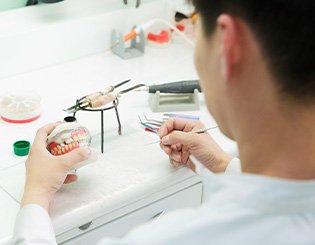Dentures – Pinehurst, NC
Trusted Prosthetics, Proven Results
Individuals living with incomplete smiles often find that they feel uncomfortable trying to eat or speak in front of others. Smiling is out of the question because of the embarrassment they feel. Being unable to live life to the fullest is why so many patients turn to Olmstead Village Dental Care for help. Offering dentures in Pinehurst, our team of experts can restore appearances, boost confidence, and improve the use of one’s smile. Call us today if you’re ready to start enjoying life again.
Who’s a Good Candidate for Dentures?

Most patients who are living with multiple missing teeth or who are without any remaining natural teeth can find hope with dentures. When meeting with our talented denture dentist, we will conduct a thorough examination of your oral anatomy to determine if you are experiencing any decay of existing teeth or gum disease. If so, we’ll need to administer appropriate treatment first. Afterward, we can move forward with replacing your missing pearly whites so that you can enjoy your smile again. Until then, here’s what typically happens with tooth loss and what would make you a good denture candidate.
Effects of Missing Teeth

Teeth can be lost in several ways—the most common ones being advanced gum disease, severe tooth decay, and accidental injury. Even if you don’t feel any discomfort, you might experience a variety of complications if your teeth aren’t replaced. These can involve trouble speaking, difficulty eating/chewing, facial sagging, and a significant decrease in confidence and self-esteem. Not only will your oral health be negatively affected, but so will your overall quality of life.
What Qualifies You for Dentures?

In many cases, those who are struggling with mild to severe tooth loss can be eligible for dentures. The only thing is that you’ll need to have healthy gum tissue and sufficient jawbone to support your prosthetics. It’s also necessary to maintain a strict oral hygiene regimen to maintain both your dentures and the rest of your smile.
Our team will also determine the kind of dentures you’ll receive based on the number of teeth that you need to replace. These options can typically involve partial, full, and implant dentures. This treatment is also ideal for those who are working with a budget, as it won’t cost nearly as much as other solutions.
Alternative Tooth-Replacement Options

Even if you aren’t a good candidate for dentures or you don’t know if this treatment is right for you, you can still explore alternative prosthetics that can effectively replace your missing teeth. Here are the other types of tooth-replacement options to consider:
- Dental Bridges – These prosthetics are best for patients who are missing one or several teeth consecutively. This “bridge” can easily close the gap in your smile by connecting the two crowns to the healthy teeth on either side.
- Dental Implants – After undergoing a minor oral surgery of embedding titanium posts into your jawbone, we can attach your new restoration(s) to completely rebuild your smile from the roots up. This treatment does require sufficient jawbone density and facial structure, and the upfront cost is higher than traditional bridges and dentures, but the results can last decades to a lifetime with proper care.
Types of Dentures

There are three types of dentures you can take advantage of – partial, full, and implant dentures.
Partial Dentures
Designed to fill in the gaps left behind by missing teeth, partial dentures are fabricated to blend in with your existing smile. Similar to how a puzzle piece works, it is created with an acrylic base that matches your natural gums with artificial teeth secured on top of the base. They are positioned in the exact spaces that need to be filled so that when the metal clasps attach to natural teeth, everything fits perfectly in place.
Full Dentures
Relying on natural suction and denture adhesive to hold them in place, full dentures restore the entire arch of missing teeth. Using an acrylic base that is fabricated with the same gum-colored material as a partial, the artificial teeth rest on top of the denture base to create a complete set. When placed in the mouth, they will sit on top of the gums to allow for an immediate transformation.
Implant Dentures
Unlike their traditional counterparts, implant dentures use titanium posts that are placed within the jaw. Positioned for optimal support, these artificial tooth roots help to stimulate the bone, while the custom restoration (denture) restores the look and function of a complete smile. With optimal care, they can last 30 years or a lifetime.
How Dentures Are Made

When you spend time learning how dentures are made, you become more appreciative of your new smile. The careful attention paid by lab technicians to craft your uniquely designed set of teeth requires time, patience, and artistic skill. As you continue to enjoy the benefits of a complete, healthy smile, take some time to discover how it was made by reading the information below.
What Are Dentures Made Of?

Two main components must come together to create your dentures: the base and your artificial teeth.
- Denture Base: The base of your denture will likely be crafted from acrylic; however, resin, nylon, and porcelain are also commonly used. These materials create the foundation for your new smile, as the artificial teeth will be secured to the base. The reason acrylic is most likely to be used is because it looks similar to natural gum tissue, delivering a look that closely aligns with your smile.
- Artificial Teeth: The artificial teeth that are created for your denture will be crafted from resin or porcelain. The latter tends to be most commonly used because of how close it looks to natural tooth enamel. When attached to the base, your full or partial denture will appear just like regular teeth.
The Denture Creation Process

When it comes to creating your dentures, there is a multi-step process that is required. Overnight dentures are not possible, as it takes technicians time to build your prosthetics as well as ensure a comfortable and proper fit.
After your dentist takes digital impressions of your smile and measurements of your jaw, a model will be sent to lab technicians, so they can begin to create your new set of teeth. Using a wax mold, they’ll attach artificial teeth and carve away any additional wax before sending it back to our office for your first fitting.
Once cleared by you and our team, the wax model will be returned to the lab for completion. Technicians will place the wax version into a flask and boil it. Plaster will be used to replace the wax so that a proper shape is made that mimics the shape of your dentures. Before the acrylic is poured in, a liquid separator will be added once the holes are placed in your dentures. This keeps any acrylic from sticking to the plaster, which is then removed to show a newly created denture.
Your teeth are then placed in an ultrasonic bath to remove the plaster before additional acrylic is trimmed away. A final polish will give your dentures the shine they need before being sent back to our office for final placement.
Adjusting to Your New Dentures

When you receive your new dentures, you will find that it takes some time to adjust to your prosthetic. Your mouth will need to learn how to maneuver its lips, tongue, and cheeks to accommodate for the foreign object. This can cause a slight change in your speech and eating habits; however, there are steps you can take to make this adjustment phase faster. For example, you can adopt a soft food diet initially before slowly integrating harder foods once you feel more confident in your chewing capabilities. Also, you can try speaking slowly or practicing various words and sounds so that you do not slur when talking.
The Benefits of Dentures

Dentures, no matter which kind you choose, will have a significantly positive impact on your life. Their look, functionality, and lifespan can give you back what you’ve been missing for so many years. Individuals who have been living with dentures mention that they appreciate numerous kinds of benefits both for their mouth and overall well-being. Here are the advantages you can expect to enjoy with these prosthetics.
Psychological Benefits

Tooth loss not only negatively impacts your smile and oral health but also your self-esteem. Most people end up feeling like they have to hide their grins whenever talking or laughing, and some even avoid engaging in social activities entirely. By replacing your missing pearly whites with dentures, you can improve your oral health as well as boost your confidence in the long run. You also won’t worry as much about things like your speech articulation, chewing ability, or appearance.
Clearer Enunciation

Not having all of your teeth can make speaking or conversing much more difficult. This is because your lips and tongue typically press against them to enunciate sounds and words. With dentures, you can renew your complete smile while allowing yourself to talk like you used to. This can take some time to get used to, but with practice and repetition, you should be able to speak like normal in no time!
Improves Nutrition

Certain healthy foods can be more difficult to eat without being able to use all of your teeth, including fruits, lean meats, and veggies. Without the ability to chew properly, you can end up with problems such as indigestion and malnutrition. By restoring your smile with dentures, your prosthetics will provide you with the functional bite necessary for expanding your dietary choices to include healthier, more nutritious foods. This will also give you the chance to receive essential minerals to help promote a stronger jawbone, gums, and overall well-being.
Preserves Oral Health

Any remaining natural pearly whites after tooth loss can start to move out of position to try to fill the gaps in your smile. This is due to the jawbone deteriorating over time, which will weaken the bone tissue and can result in further tooth loss. With dentures, you can help keep your other teeth in place while evenly distributing the pressures of everyday chewing, significantly reducing wear and tear over time.
Expands Opportunities

Your smile is the very first thing people typically notice during an initial greeting. For this reason, it can be quite important to be able to show off a full smile when introducing yourself, as this can impact the way people perceive you. Dentures can help you make a great first impression by providing the complete grin you deserve, which can end up expanding your opportunities in both professional and social settings.
Understanding the Cost of Dentures

Your financial situation should never stand in the way of treating tooth loss. Although dentures are attributed to being expensive, they are more affordable than you might think. You can't put a price on the benefits of replacing your lost teeth. Many factors affect the cost of dentures, but Dr. Hudson has the financial solutions you need to complete your smile.
Factors That Affect the Cost of Dentures

There's no one-size-fits-all denture because every mouth is as unique as fingerprints. Not to mention, every situation differs. There isn't any way to know how much you'll pay until after your consultation. While every case is different, you can expect your estimate to include:
- Consultation: You'll first need to have a consultation. Dr. Hudson will examine your mouth and learn more about your health history.
- Prep Work: Based on the results of your consultation, you may require a little prep work, like tooth extractions or gum disease therapy.
- Type of Denture: The number of teeth you're replacing will affect the cost, as well as if you're treating one or both arches.
- Materials: High-quality materials may cost more, but they are often more comfortable, durable, and aesthetically pleasing.
Are Implant Dentures More Expensive?

You may pay more upfront for implant dentures, but they are the most cost-effective overall. Dental implants have over a 95% success rate and can last for 30 years or more, unlike traditional dentures, which have a lifespan of 5 to 7 years. Not to mention, implant dentures preserve your jawbone to improve your oral health. As the next best thing to real teeth, the benefits of implant dentures are immeasurable.
Does Dental Insurance Cover Dentures?

Your dental insurance won't pay for the entire process, but you can use your benefits to lower your out-of-pocket expenses for certain steps. Your insurance may cover your consultation, diagnostic services, and medically necessary procedures. Dentures are considered a major service, which is typically covered by 50%. After meeting your annual deductible, you can use your coverage to reduce the cost until you reach your yearly limit. We will work on your behalf with your dental insurance to maximize your benefits.
Other Options for Making Dentures Affordable

Besides using your dental insurance, Dr. Hudson accepts multiple payment methods, including:
- Traditional Payments: Our office accepts cash, credit cards, and personal checks.
- Financing: You can pay for any out-of-pocket costs using a monthly payment plan through a third-party financing company, like CareCredit. You can enjoy little or no interest in financing based on your credit approval.
We will help you find the solutions you need to rebuild a beautiful smile without spending your life’s savings.
Dentures Aftercare

Dentures can restore your smile’s appearance and functionality, but that doesn’t mean you no longer need to visit us. Scheduling a routine checkup appointment with Dr. Hudson every six months allows us to monitor your condition and ensure that your gum tissue, any remaining teeth, and your prosthetics all stay in good shape. Our team can spot early indicators of potential problems, like gum disease, and address them before they can progress.
It’s also important to consistently care for your dentures at home, too. Continue reading to learn more about how to maintain them properly, and feel free to contact us for more information.
Removable Dentures

Remove After Eating
One of the greatest advantages of having dentures is that they restore your ability to chew your food sufficiently enough to be more easily swallowed and digested. However, they can trap bits of food in the space between your gums and your artificial teeth, which attracts bacteria that contribute to oral issues.
Holding them under gently running water after you eat or drink anything gets rid of unwanted germs and leftovers to keep plaque from forming. Remember to use cool or room temperature water, though, because overly hot temps can warp the acrylic base.
Clean Your Restoration
Many patients wonder if it’s okay to brush their dentures in their mouths. It might be acceptable occasionally, but you can’t reach all sides of it that way. Instead, we recommend that you take them out twice daily to wash all their surfaces thoroughly. Standard toothpaste can be abrasive on your prosthetics, so brush them clean with a soft-bristled brush and mild dish soap or a special cleanser.
Then, rinse them off and put them back into your mouth before going about your day. If it’s evening and you’re heading to bed for the night, leave them in a container to soak while you sleep.
Keep Your Dentures Safe
When you brush your dentures, they are likely to become slippery and can easily slip from your grasp. Unfortunately, if they fall from a great enough height, they can become chipped, cracked, or fractured.
To keep them safe and whole, try placing a soft towel or other cushion underneath so if they tumble, they won’t be injured. Also, try to keep them out of the reach of small children or pets who may not handle them carefully.
Remove Dentures When You Sleep
Once you’ve adjusted to wearing artificial teeth all day, you might forget they’re there and accidentally fall asleep with them in your mouth. This can be harmful to your restoration as well as your dental condition. Your gums need a break from supporting them all day for the tissue to remain healthy, or you might develop sores or blisters.
Furthermore, your mouth tends to dry out at night, which encourages unhealthy bacteria to thrive. Not only can this form plaque on your dentures, but it can also lead to gum disease and bad breath. Instead, remove them to clean them and then leave them to soak in a glass of water or a special solution to eradicate up to 99% of germs while you sleep.
Notice Changes
Paying attention to your oral status ensures that if there are changes, you’ll notice in time to contact us to make an appointment. For instance, if your gums feel sore or inflamed or look darker than usual, you may have developed gum disease that requires professional intervention. Similarly, if you notice your dentures are wiggling in place or making a clicking sound when you open and close your mouth, then you should contact our office to schedule a visit to ensure that they still fit correctly.
Dentures FAQs
Will Dentures Change the Shape of My Face?
Yes – dentures will change the shape of your face. That said, this shift has positive results. It’ll help you look younger and more vibrant.
You see, losing teeth affects more than your smile. It also causes your facial muscles to sag, leading to wrinkly and saggy skin. This latter effect makes your face look sunken over time. However, dentures will prevent and reverse such collapse. They’ll support your facial muscles and thus improve your appearance. By using them, your face should seem firmer, fuller, and more youthful.
Will It Hurt to Get Dentures?
In most cases, getting dentures involves little or no pain. Dentists strive to ensure treatment goes as smoothly as possible. So, there shouldn’t be any major discomfort.
Of course, things change if you undergo tooth extraction first. Your mouth will likely feel sore after this oral surgery. Still, any aches should improve in a few days. You can also manage them with prescribed pain medication.
At the same time, you may face some irritation when you first wear dentures. Your new appliance will feel unfamiliar and may cause slight pain. Luckily, this effect is also temporary and fades quickly.
Do Upper Dentures Always Cover the Palate?
Many upper dentures feature a plate that covers the palate. Even so, this plate isn’t a vital part of these restorations. Patients can opt for “palateless” dentures – ones that don’t cover the roof of your mouth.
Indeed, some folks don’t like dentures that cover the palate. This coverage can interfere with a patient’s ability to taste food. What should be a flavorful meal then becomes tasteless and bland. With the palate’s taste buds covered, you can’t sense as much from your food.
Given these facts, many dentists offer “palateless” upper dentures. These kinds don’t have plates that cover the upper palate. Instead, they can use a conventional horseshoe-shaped structure or take the form of implant dentures.
Is It Hard to Talk with Dentures?
Initially, it can be hard to talk with dentures. Most patients need to get used to speaking with artificial teeth. On the bright side, it becomes easier to talk with them over time.
Usually, the time it takes to speak clearly with dentures varies. Some patients take longer to adjust than others. However, the adjustment process does go more quickly when you practice more. Examples of such practices include reading aloud, speaking slowly, using denture adhesive before you talk, etc. These habits help you learn to speak clearly sooner.

